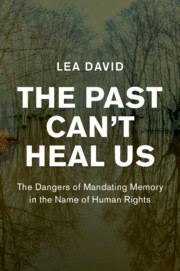Book contents
- The Past Can’t Heal Us
- Human Rights in History
- The Past Can’t Heal Us
- Copyright page
- Contents
- Acknowledgements
- Abbreviations
- 1 Introduction
- 2 Human Rights As an Ideology?
- 3 What Is Moral Remembrance?
- 4 The Institutionalisation of Moral Remembrance
- 5 The Institutionalisation of Moral Remembrance
- 6 Human Rights, Memory and Micro-Solidarity
- 7 Mandating Memory, Mandating Conflicts
- Bibliography
- Index
3 - What Is Moral Remembrance?
Published online by Cambridge University Press: 26 June 2020
- The Past Can’t Heal Us
- Human Rights in History
- The Past Can’t Heal Us
- Copyright page
- Contents
- Acknowledgements
- Abbreviations
- 1 Introduction
- 2 Human Rights As an Ideology?
- 3 What Is Moral Remembrance?
- 4 The Institutionalisation of Moral Remembrance
- 5 The Institutionalisation of Moral Remembrance
- 6 Human Rights, Memory and Micro-Solidarity
- 7 Mandating Memory, Mandating Conflicts
- Bibliography
- Index
Summary
This chapter traces the rise of moral remembrance. It deals with the gradual emergence of memorialisation standards and policy-oriented attempts to engage transitional societies in developing and adopting specific normative forms of remembrance. This perspective of ‘globalised and standardised cultures of memory’ has been heavily embedded and dispersed through an accumulative process – the institutionalisation and ideologisation of human rights. Gaining their power and legitimacy from the world polity level, moral concerns are promoted through a ‘facing the past’, ‘duty to remember’ and ‘justice for victims’ agenda that is supposed to prevent a recurrence of violent conflicts. Following on from the transitional justice paradigm that brought to the fore primarily legal mechanisms to deal with past human rights abuses, since 2000 memorialisation has been seen as central to the processes of democratisation and regional integration. In practice, this has brought a tremendous change in how memorialisation processes are understood, moving the paradigm from a ‘duty to remember’ to specific, policy-oriented ‘memorialisation standards’. Standardisation of memory has further enabled the production of a human rights memorialisation toolkit that has come to be understood as a panacea for post-conflict peacebuilding efforts and the enforcement of human rights around the globe.
Keywords
- Type
- Chapter
- Information
- The Past Can't Heal UsThe Dangers of Mandating Memory in the Name of Human Rights, pp. 41 - 65Publisher: Cambridge University PressPrint publication year: 2020

